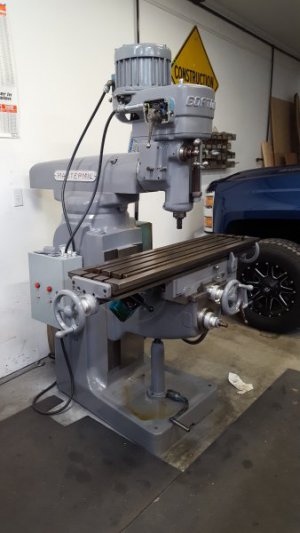- Joined
- Jan 2, 2019
- Messages
- 6,519
Hi,
I currently have a small home shop with nice older/antique machines, lathe, drill press, sanders, grinders, etc. - no mill at this time although I miss my old Gorton 1-22.
My space is very limited so I'm torn between finding a small manual mill and learning CNC with a small hobby machine. Of course I realize the little china kits will only work with wood or plastic, but I'm assuming the skills you learn there will transfer to larger machines once I get the space/budget for something better.
I've been working around power tools my whole life though my engineer father made sure it wasn't my career. I'm currently a network admin/engineer and consider myself very competent with computers although I have limited experience in 3D cad/cam types of software. Hopefully it's gotten easier since the early days of AutoCad .
.
So, I mostly just work in the shop for relaxation but you never know where life will lead you ( I used to have a power equipment business). And, as cool as learning how things were done 100-years-ago with my Seneca Falls lathe I have this feeling that I could do much cooler stuff with CNC or 3D printing. I just don't know if the learning curve will prove too steep and would rather not start out with a $10,000 machine that will end up sitting because I don't want to work that hard at it.
My gut tells me to look for a project that someone else has moved on from for the first try, something small that will fit on my basement work table.
I know some of you have been where I am and probably have good advice, maybe even a lead on a machine that would be suitable.
Cheers,
John
I currently have a small home shop with nice older/antique machines, lathe, drill press, sanders, grinders, etc. - no mill at this time although I miss my old Gorton 1-22.
My space is very limited so I'm torn between finding a small manual mill and learning CNC with a small hobby machine. Of course I realize the little china kits will only work with wood or plastic, but I'm assuming the skills you learn there will transfer to larger machines once I get the space/budget for something better.
I've been working around power tools my whole life though my engineer father made sure it wasn't my career. I'm currently a network admin/engineer and consider myself very competent with computers although I have limited experience in 3D cad/cam types of software. Hopefully it's gotten easier since the early days of AutoCad
So, I mostly just work in the shop for relaxation but you never know where life will lead you ( I used to have a power equipment business). And, as cool as learning how things were done 100-years-ago with my Seneca Falls lathe I have this feeling that I could do much cooler stuff with CNC or 3D printing. I just don't know if the learning curve will prove too steep and would rather not start out with a $10,000 machine that will end up sitting because I don't want to work that hard at it.
My gut tells me to look for a project that someone else has moved on from for the first try, something small that will fit on my basement work table.
I know some of you have been where I am and probably have good advice, maybe even a lead on a machine that would be suitable.
Cheers,
John



